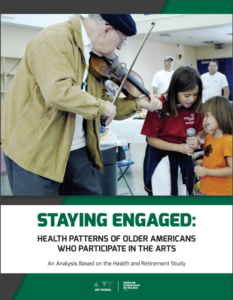Told ya!
Those of us in the non-profit arts sector are accustomed to constantly arguing for the value of the arts, but making a case for the importance of arts education for older adults is yet another hurdle to overcome. When The Creativity and Aging Study led by Dr. Gene Cohen was published in 2006 those of us in the arts community rejoiced. The study demonstrated that professionally conducted, sequential arts-learning programs promoted better health and disease prevention among older adults who actively engaged in them. While we always instinctively knew that the arts are good for you, we now had some science to back us up.

As we, here at Lifetime Arts, and others spoke about Creative Aging around the country we hung our hat on this particular study. However, there was clearly a need for additional and more current research. In the ensuing years there have been a number of studies, most discipline specific. They include, among others, Theatre Arts for Improving Cognitive and Affective Health (Drs. Noice, Noice, Kramer 2013) The Effects of Singing on Older Adults (Dr. Julene K. Johnson, Institute for Health & Aging at University of California, San Francisco 2013) Creativity in Later Life (K.A. Price, A.M Tinker 2014), and Healthy Aging Persons and Their Brains: Promoting Resilience Through Creative Engagement (Susan H. McFadden, PhD, Anne D. Basting, PhD 2010).

Most recently, The NEA published Staying Engaged: Health Patterns of Older Americans Who Engage in the Arts (2017). “Staying Engaged” is based on the results of a study conducted by the University of Michigan with primary support from the National Institutes of Health. The authors of “Staying Engaged” saw an association between arts participation and favorable health outcomes. They found that older adults who both created art and attended arts events reported higher cognitive functioning and lower rates of both hypertension and limitations to their physical functioning than did older adults who neither created nor attended art. In fact, among older adults who both created and attended, cognitive functioning scores were seven-fold higher than for adults who neither created nor attended. Moreover, the frequency with which these adults attended arts events or created art is seen as a factor in the positive relationship with health. Similarly, older adults who reported that they both created art and attended arts events experienced slower rate of declines in cognitive functioning. They also reported slower growth in their rates of hypertension and physical limitations than did the non-creating, non-attending adults. For the health outcomes studied, “Staying Engaged” finds that even adults who frequented arts events, but did not report creating artwork of their own, enjoyed some health advantages over adults who neither created nor attended art.
For those older adults who are already inclined to participate in or attend an arts event there’s an added benefit. For those who aren’t, give them some encouragement. They may get healthier, and who knows, they may enjoy it!

